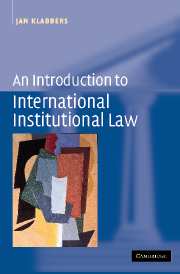Book contents
- Frontmatter
- Contents
- Preface
- Acknowledgements
- Table of cases
- A note on documentation
- List of abbreviations
- 1 Introduction
- 2 The rise of international organizations
- 3 The legal position of international organizations
- 4 The foundations of powers of organizations
- 5 International organizations and the law of treaties
- 6 Issues of membership
- 7 Financing
- 8 Privileges and immunities
- 9 Institutional structures
- 10 Legal instruments
- 11 Decision-making and judicial review
- 12 Dispute settlement
- 13 Treaty-making by international organizations
- 14 Issues of responsibility
- 15 Dissolution and succession
- 16 Concluding remarks: re-appraising international organizations
- Bibliography
- Index
3 - The legal position of international organizations
Published online by Cambridge University Press: 05 June 2012
- Frontmatter
- Contents
- Preface
- Acknowledgements
- Table of cases
- A note on documentation
- List of abbreviations
- 1 Introduction
- 2 The rise of international organizations
- 3 The legal position of international organizations
- 4 The foundations of powers of organizations
- 5 International organizations and the law of treaties
- 6 Issues of membership
- 7 Financing
- 8 Privileges and immunities
- 9 Institutional structures
- 10 Legal instruments
- 11 Decision-making and judicial review
- 12 Dispute settlement
- 13 Treaty-making by international organizations
- 14 Issues of responsibility
- 15 Dissolution and succession
- 16 Concluding remarks: re-appraising international organizations
- Bibliography
- Index
Summary
Introduction
International organizations are generally counted among the subjects of international law, together with states, individuals and perhaps some other entities as well. Thus, in accordance with the standard definition of ‘subject’, they are deemed capable of independently bearing rights and obligations under international law.
This has not always been the case. In the late nineteenth and early twentieth century, it was customary for international lawyers to claim that states, and states alone, could independently bear rights and obligations under international law. Other entities were not to be considered as subjects or, at best, were analysed in state-centric terms: as gatherings of states, or as derogations from statehood (servitudes, for example) or as essentially unclassifiable experiments. And the question as to whether international organizations could be regarded as subjects of international law reverberated well into the second half of the twentieth century.
As the International Court of Justice recognized in the Reparation for Injuries opinion, international law's subjects may come in various shapes and guises. The Court held that: ‘[t]he subjects of law in any legal system are not necessarily identical in their nature or in the extent of their rights, and their nature depends on the needs of the community’.
There is no standard set of rights and obligations each and every subject of international law possesses; instead, ‘subject’ is a relative notion, the precise contents of which may differ from subject to subject and even between various subjects of the same category.
- Type
- Chapter
- Information
- An Introduction to International Institutional Law , pp. 42 - 59Publisher: Cambridge University PressPrint publication year: 2002



